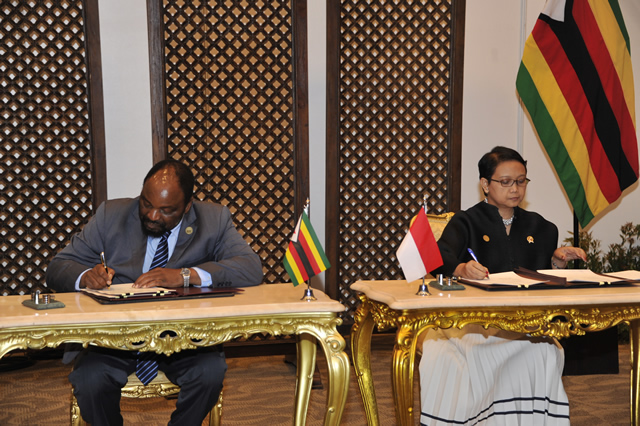10 leaders expected for summit today

 Herald Reporters
Herald Reporters
Ten Sadc Heads of State and Government are expected in Harare today ahead of the regional bloc’s Extraordinary Summit set for tomorrow to discuss Sadc’s draft industrialisation strategy and the Regional Indicative Strategic Development Plan.
Other countries out of the 15 member-states will be represented by high-ranking officials.
The Sadc Council of Ministers held its Extraordinary meeting yesterday and adopted the draft industrialisation strategy that will be presented to the Heads of State and Government Summit.
Addressing a media briefing after the meeting, Sadc Council of Ministers chairman and Foreign Affairs Minister Simbarashe Mumbengegwi said the draft strategy would promote the exploitation of the region’s resources for the benefit of its people through value-addition and beneficiation.
“The industrialisation strategy that will be developed focuses on a number of areas,” he said.
“The areas that the strategy will look at are related to the whole question of agro-processing. As you know, the bulk of our products are exported in their raw form and we get little returns from them. The idea is that the processing should be done in the region.”
Minister Mumbengegwi said other areas that they looked at related to the growth of the manufacturing sector through value-addition and beneficiation of the region’s vast mineral resources.
“The idea to process them locally is so that not only will we be able to access the finished product at a reasonable price, but we will also be able to get better returns from exporting them.”
Minister Mumbengegwi said Sadc had to address a number of pre-requisites like energy, infrastructure and human resources development to ensure the success of the strategy.
“To have this (value addition and beneficiation) a number of factors have to be addressed,” he said.
“You cannot manufacture or beneficiate without the requisite skills base, therefore, we need to invest in skills training and human resources development.
“You also cannot do it without energy and as you know we have an energy deficit in the region, so this is an area the region has to address. We also have to look at infrastructure, roads and railways. The strategy does appreciate that many of these things have to be done at a national level, but some of them can be done at a regional level.”
Minister Mumbengegwi said Sadc would leverage its abundant natural resources for funding, saying the draft regional policy, if adopted, would not rely on donor funding.
“Our strategy is not looking for aid but business,” he said.
“We will look at bankable projects where investors can come in and make handsome returns from their investments. We are looking at our resources, we have abundant resources and we can leverage these resources.”
In his remarks while officially opening the Sadc Council of Ministers Extraordinary meeting, Minister Mumbengegwi said the success of the industrialisation strategy and roadmap hinged primarily on effective partnerships between Government and the private sector.
“The Draft Sadc Strategy and Roadmap before you, recognises that industrial policy formulation and implementation will largely be undertaken at the national level and that its success will depend on forging effective partnerships between Government and the private sector,” he said.
“It also seeks to engender major economic and technological transformation and national and regional levels, aimed at accelerating growth and enhancing comparative and competitive advantages of the economies of the region.”
Minister Mumbengegwi said the policy, if adopted, would be implemented from now until 2063 when the regional is expected to have attained high levels of economic growth.
Addressing the same meeting, Sadc executive secretary Dr Stergomena Lawrence Tax said: “We are confident that both the Regional Industrialisation Strategy and Roadmap, and the revised RISDP once approved by the Summit will set the region’s path to industrialisation and socio-economic prosperity of our citizens.”
She said the strategy was premised on that regional integration was important to accelerate industrialisation.
“While the decision to re-orient the Sadc regional integration path with proper linkages between industrialisation and market liberalisation is indeed a timely decision, the strategy will bear the intended results only if matched with practical actions and the needed resources, both human and financial,” said Dr Tax.
“This will no doubt require not just goodwill and hope, but a robust financial strategy, commitment and determination from all concerned, to stay the course that we have chosen.”








Comments